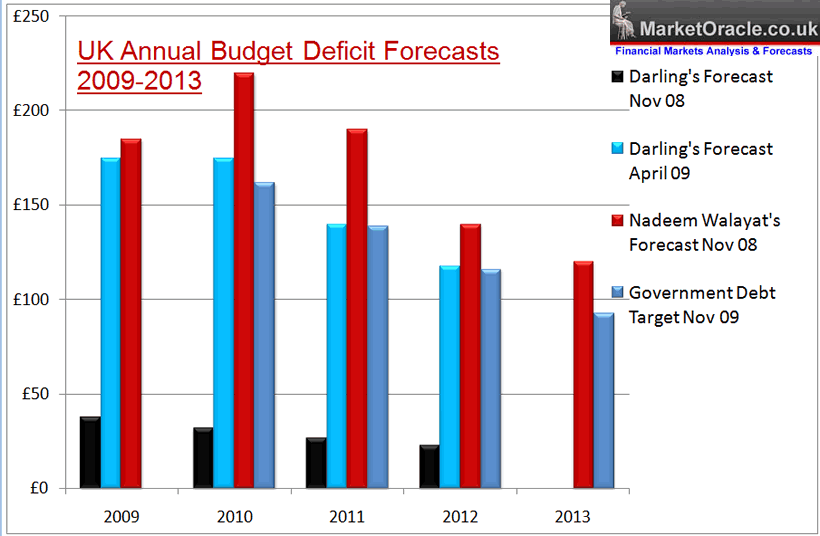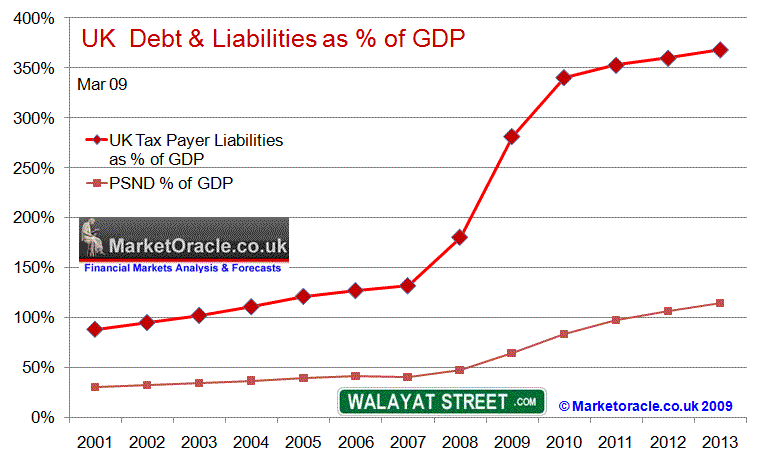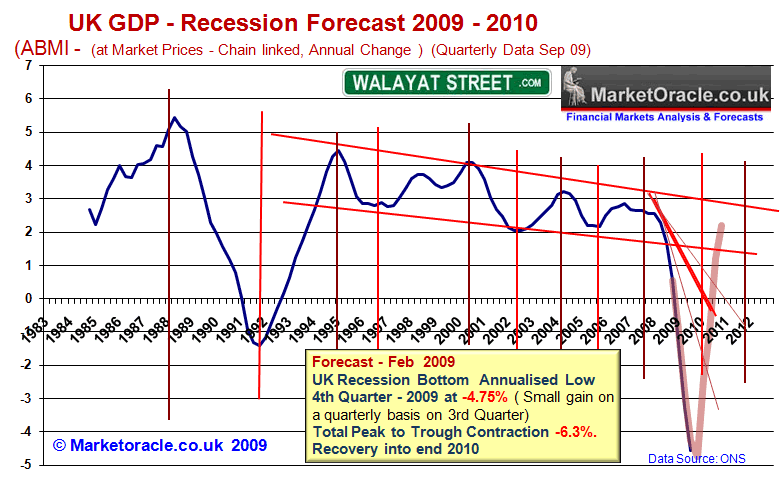Budget Deficit Cutting Solutions to Britain's Debt Crisis
Economics / UK Debt Dec 29, 2009 - 01:15 AM GMTBy: Nadeem_Walayat
 This article is part of in-depth analysis that will conclude in a forecast for the UK economy for 2010 and 2011 and which follows the completion of the forecast for UK CPI inflation 2010 , which will be followed by the UK interest rate forecast for 2010 later this week. The whole scenario and implications of will be published as an ebook that I will make available for FREE, ensure you are subscribed to my always free newsletter to get the completed scenario in your email box and check current analysis at http://www.walayatstreet.com.
This article is part of in-depth analysis that will conclude in a forecast for the UK economy for 2010 and 2011 and which follows the completion of the forecast for UK CPI inflation 2010 , which will be followed by the UK interest rate forecast for 2010 later this week. The whole scenario and implications of will be published as an ebook that I will make available for FREE, ensure you are subscribed to my always free newsletter to get the completed scenario in your email box and check current analysis at http://www.walayatstreet.com.
The next government's primary objective will be to to get an urgent grip with Britain's out of control budget deficit that risks an out of control inflationary debt spiral due to ever escalating interest payments exacerbated by a deprectiating currency as a consquence of continuing money printing (QE) to monetize the deficit.
The Labour Governments most recent updated projection for the annual Public Sector Net annual deficit remains unchanged against Alistair Darlings April 09 targets, as well as my original estimate of November 2008 (Bankrupt Britain Trending Towards Hyper-Inflation? ).

The target PSND of £1,300 trillion would approximately equate to 100% of GDP by 2013/14. This is against my original target as of November 2008 of £1.48 trillion by the end of 2003/14 at a projected 114% of GDP.

The existing government deficit reduction targets as of the November 2009 budget is to reduce the deficit by £23 billion per year for the year 2010-11 onwards. However as I pointed out in the article Britain's Inflationary Debt Spiral as Bank of England Keeps Expanding Quantitative Easing, reducing the deficit by £23 billion per year does nothing to stop the deficit from expanding by a further £510 billion or 42% of GDP, i.e. there is NO DEBT REDUCTION, Instead DEBT Escalates by a further £510 Billion. Therefore the Labour governments deficit reduction targets are NOT sustainable, as the market will NOT allow £510 billion of new debt to be issued on top of the existing debt mountain of over £1 trillion. Which is leaving aside for the moment total liabilities that look set to expand to over £4.75 trillion.
Solution to Britain's Debt Crisis
The only solution to the path Britain is on is for a balanced budget, in that regard the best way to achieve a balanced budget is to grow ones way out of debt i.e. increase revenues, failing that the option available is to inflate ones way out of debt which is what the Labour government has enacted through its policies of Quantitative Easing, Zero Interest rates and increased public spending. However what a government should not do is to listen to the deflationists and trigger another recession.
So it is going to be a tough balancing act for the next government as it will need to cut spending, increase taxes AND grow the economy so as to bring the deficit under real control, not the nonsense of cutting the deficit of £23 billion per year for the next four years which as I have illustrated means at least an extra £510 billion of debt.
The current financial years deficit is projected to be £185 billion or 15% of GDP, this needs to be cut to below 5% of GDP or £60 billion, within a short period of time but WITHOUT triggering a Double Dip Recession, which would just bring Britain back to square one i.e. were we were 6 months ago.
How to Really Cut the Deficit
Spending Cuts
Both Labour and the Conservatives have made loud noises of making severe cuts to public spending but when one looks at the actual figures pumped out they are non existant for the Conservatives and show INCREASED public spending for Labour. This is clearly electioneering therefore without any real contract figures before me I can only guesstimate that cuts of approx 4% will follow in the post election budget which is significantly less than the 10% that would be necessary, which is not going to happen when the mega spending departments of NHS, Education and Welfare have been ring fenced for growth, which means a 10% cut is impossible. Public sector spending cut by 4% would equate to about £24 billion.
Economic Growth
My existing forecast for the UK economy is on track for 2% growth for 2010, therefore this should like for like imply a 2% cut in the annual deficit or £24 billion by means of increased revenues due to economic growth.
Tax rises
Tax rises have already been scheduled by Labour party to start kicking in during 2010, with the first on 1st of Jan 2010 when VAT goes back up from 15% to 17.5% with NI scheduled to follow in April. Add to this the projected post election tax hikes of an increase in the basic rate of income tax to 24p and higher upper band increased from 40p to 45p.Though a further VAT hike to 20% may be overkill and could trigger the feared double dip recession that would be a disaster, so I doubt if 20% VAT will follow, but it is a tough call as it could raise a further £12 billion per year. In conclusion total tax revenues could increase by a sizeable £30 billion a year and contribute to a significant dent in the deficit.
Cutting the Deficit
There putting all of the probable spending cuts, tax rises and increased revenues from economic growth all together, then by the start of financial year 2011 the budget deficit could be cut by £78 billion to approx £100 billion instead of the Labour governments target of £162 billion. A deficit of £100 billion would still equate to about 8% of GDP, so would still require more money printing to monetize government debt, but the cuts would not be so severe as to trigger a double dip recession and therefore allow the government to both grow and inflate its way out of debt during the subsequent years i.e. the country will experience below trend growth coupled with higher inflation that would target a rate above the Bank of England's 3% limit, which suggests that the next UK Government may set a NEW Inflation band of 2% to 4%, which is inline with the outlook being painted by the inflation forecast.
On this basis the deficit could be cut to about 4% of GDP by the end of the third year of the next government, so hope for saving Britain from the debt spiral is not lost, but it does require urgent action as the longer the country accrues budget deficits of approaching £200 billion the greater will be the price paid in terms of debt interest payments that are already at £44 billion per year and could easily pass £80 billion if the Labour parties current 5 year deficit reduction proposals are followed.
Learn the Lessons from the Financial Crisis
I hope the next Government will have learned the primary lesson from last years Financial Crisis, which is that the longer you leave a crisis to fester the greater will be the eventual crash. With regards Britians Debt Spiral, that crash would be for UK Government Bonds and Sterling, which would trigger panic reactive measures. So it is infinitely better to grab the debt bull by the horn BEFORE the inevitable debt collapse occurs.
Debt Fuelled Economic Recovery
UK GDP for the 3rd Quarter was revised marginally higher to minus 0.2% from the earlier ONS estimate of minus 0.3%. The GDP trend for the UK economy for 2009 has been accurately mapped out in the in depth analysis and forecast of 17th February 2009 (UK Recession Watch- Britain's Great Depression?), that both called for severe peak to trough economic contraction of -6.3% at a time when the likes of the UK Treasury were forecasting contraction of less than half at -3%. The analysis also concluded in a strong debt fuelled economic recovery during 2010 to coincide with a summer 2010 General Election. As of the revised ONS GDP data (ABMI Chain linked at Market Prices) total peak to trough contraction is now 6.23% virtually exactly inline with the forecast for -6.3%. Annualised contraction for the third quarter is at -4.56% with trend on target for -4.75% for the fourth quarter.

The UK economy remains on track to bounce back strongly during 2010, as indicated by June's in depth analysis, however this economic recovery is based largely on debt, as the Labour government's strategy is to deliver the next Conservative government a scorched earth economy.
The UK GDP in-depth analysis will seek to update and forecast the UK economy at least 2 years forward. To ensure you the analysis and forecast in your email in-box ensure you are subscribed to my always free newsletter.
Source: http://www.marketoracle.co.uk/Article16111.html
By Nadeem Walayat
http://www.marketoracle.co.uk
Copyright © 2005-09 Marketoracle.co.uk (Market Oracle Ltd). All rights reserved.
Nadeem Walayat has over 20 years experience of trading derivatives, portfolio management and analysing the financial markets, including one of few who both anticipated and Beat the 1987 Crash. Nadeem's forward looking analysis specialises on the housing market and interest rates. Nadeem is the Editor of The Market Oracle, a FREE Daily Financial Markets Analysis & Forecasting online publication. We present in-depth analysis from over 500 experienced analysts on a range of views of the probable direction of the financial markets. Thus enabling our readers to arrive at an informed opinion on future market direction. http://www.marketoracle.co.uk
Disclaimer: The above is a matter of opinion provided for general information purposes only and is not intended as investment advice. Information and analysis above are derived from sources and utilising methods believed to be reliable, but we cannot accept responsibility for any trading losses you may incur as a result of this analysis. Individuals should consult with their personal financial advisors before engaging in any trading activities.
Nadeem Walayat Archive |
© 2005-2022 http://www.MarketOracle.co.uk - The Market Oracle is a FREE Daily Financial Markets Analysis & Forecasting online publication.



